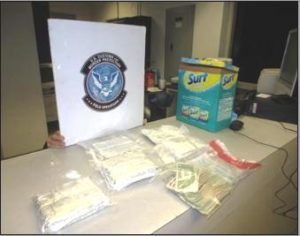Yen Ling Chen, a citizen of Taiwan, pled guilty today at the federal courthouse in Brooklyn, New York, before the Honorable Nicholas G. Garaufis to violating the International Emergency Economic Powers Act by attempting to export weapons-grade carbon fiber from the United States to Taiwan. According to the indictment and facts presented today in court, Chen was arrested in the United States after attempting to negotiate a deal to acquire tons of the specialized fiber, which has applications in the defense and aerospace industries and is therefore closely regulated by the United States Department of Commerce.
The plea was announced by Loretta E. Lynch, United States Attorney for the Eastern District of New York; James T. Hayes, Jr., Special Agent-in-Charge, U.S. Immigration and Customs Enforcement, Homeland Security Investigations (HSI), New York; and Sidney Simon, Special Agent-in-Charge, U.S. Department of Commerce (DOC), Office of Export Enforcement, New York Field Office.
On April 25, 2012, the defendant contacted an undercover agent in Brooklyn via the Internet and indicated that she and others were interested in purchasing several tons of carbon fiber. Shortly thereafter, the defendant and an accomplice wired $1,000 to a United States bank account, as a deposit on a sample. In furtherance of the export scheme, and in an effort to secure a source of the controlled commodity, the defendant traveled from Taiwan to the United States on July 5, 2012, for the purpose of obtaining the sample. During a meeting with an undercover agent the following day, the defendant assisted in negotiating the deal and making arrangements for the delivery of the sample to Taiwan for further analysis.
Certain types of carbon fiber, such as the type defendant Chen sought to acquire in this case, are closely controlled for nuclear non-proliferation and anti-terrorism reasons. The regulation of carbon fiber falls under the jurisdiction of the Department of Commerce, which reviews and controls the export of certain goods and technology from the United States to foreign countries. In particular, the Commerce Department has placed restrictions on the export of goods and technology that it has determined could make a significant contribution to the military potential or nuclear proliferation of other nations, or that could be detrimental to the foreign policy or national security of the United States.
Carbon fiber composites are ideally suited to applications where strength, stiffness, lower weight, and outstanding fatigue characteristics are critical requirements. These composites also can be used in applications where high temperature, chemical inertness, and high damping are important. The two main applications of carbon fiber are in specialized technology, which includes aerospace and nuclear engineering, and in general engineering and transportation. In addition, certain carbon fiber-based composites, such as the material sought by the defendant, are used in military aircraft.
When sentenced, Chen faces up to 20 years in prison.
“The defendant tried to circumvent laws that are intended to protect our national security by preventing specialized technologies from falling into the wrong hands,” stated United States Attorney Lynch. “Today’s conviction should leave no doubt that the United States will vigorously prosecute violations of our laws that help maintain the superiority of our armed forces on land, at sea, and in the air.” Ms. Lynch added that the government’s investigation is ongoing.
“In the wrong hands, this sensitive commodity could be used to produce materials that threaten the national security of the United States,” said HSI Special Agent-in-Charge Hayes. “Homeland Security Investigations will continue to remain vigilant in its mission to protect our citizens and residents.”
“Today’s plea demonstrates our resolve to prevent potentially dangerous technologies with both nuclear and missile applications from falling into the wrong hands. We will continue to work hand in hand with our law enforcement partners in the worldwide pursuit of those who flout our export control laws,” stated DOC Special Agent-in-Charge Simon.
The government’s case is being prosecuted by Assistant United States Attorneys Seth DuCharme and David Sarratt, with assistance from Trial Attorney David Recker of the Department of Justice Counterespionage Section. Assistance was also provided by Trial Attorney Dan E. Stigall of the Department of Justice Office of International Affairs.
SOURCE: BUREAU OF INDUSTRY AND SECURITY


